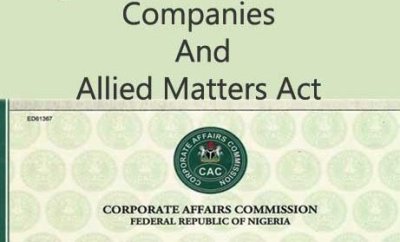New CAMA 2020: The Amended Companies and Allied Matters Bill

This was disclosed in a statement signed by the Special Adviser to President on Media and Publicity, Femi Adesina who stated that the amended act is expected to greatly improve the ease of doing business in Nigeria.
Read Also: Lagos Announces N10 Billion Public-Private Partnership to Establish an Aquaculture Center
The statement revealed that the President’s approval annulled and replaced the extant Companies and Allied Matters Act, 1990; an Act that has lasted for 30 years. The amended Companies and Allied Matters bill has established new improvements in the Act geared toward improving the operating business environment of Nigeria.

Outstanding Changes in the New CAMA 2020: The Amended Companies and Allied Matters Bill
Filing fee reductions and other reforms to make it easier and cheaper for small and medium-sized enterprises to register and reform their businesses in Nigeria;
Allowing corporate promoters of companies to establish private companies with a single member or shareholder, and creating limited liability partnerships and limited partnerships to give investors and business people alternative forms of carrying out their business in an efficient and flexible way;
Innovating processes and procedures to ease the operations of companies, such as introducing Statements of Compliance; replacing “authorized share capital” with minimum share capital to reduce costs of incorporating companies; and providing for electronic filing, electronic share transfers, e-meetings as well as remote general meetings for private companies in response to the disruptions to close contact physical meetings due to the COVID-19 pandemic;
Requiring the disclosure of persons with significant control of companies in a register of beneficial owners to enhance corporate accountability and transparency; and
Enhancing the minority shareholder protection and engagement; introducing enhanced business rescue reforms for insolvent companies; and permitting the merger of Incorporated Trustees for associations that share similar aims and objectives.
The new Act provides for remote or virtual meetings, provided that such meetings are conducted in accordance with the Article of Association of the company. This is to facilitate participation from any location at minimal costs. This is most relevant today, given the Covid-19 pandemic.
The New Act ensures that the appointment of Company Secretary is now optional for private companies. According to section 330 (1) of the new Companies and Allied Matters Act (CAMA), the appointment of a company’s secretary is only mandatory for public companies.
Section 307 (1) of the new Act prohibits a person from being a Director in more than five public companies at a time.
The new Act introduces a framework for rescuing a company in distress to keep it alive as against allowing such an entity to become insolvent. Provisions were made with respect to the Company Voluntary Arrangements, Administration, and Netting.
Small companies or any company having a single shareholder are no longer mandated to appoint auditors at the annual general meeting to audit their financial records. Section 402 of the new CAMA provides for the exemption in relation to the audit of accounts in respect of a financial year.
Section 265 (6) restricts firms from appointing a director to hold the office of the Chairman and Chief Executive Officer of a private company.
Section 40 (1) of the CAMA introduces that Statement of Compliance be signed by an applicant or his agent, confirming therein requirements of the law as to registration have been complied with. This serves as an alternative to the requirement to submit a Declaration of Compliance signed by a lawyer or attested to before a notary public.
Section 98 of the new CAMA stated that every company is required under the previous Act to have a common seal, the use of which is to be regulated by the Articles of Association. This amendment is in line with international best practices as most jurisdictions around the world have expunged the requirement from their respective laws.
According to section 861, the new CAMA provides that certified true copies of electronically filed documents are admissible in evidence with equal validity with the original documents. Section 176 (1) also provides that instruments of transfer of shares shall include electronic instruments of transfer.
The approval of the new CAMA 2020 demonstrates the government’s commitment to improving the ease of doing business in Nigeria. The various reforms of the new act will simplify regulatory processes, improve the operating business environment and re-energize the private sector which is the growth engine of Nigeria.
For more information, visit https://statehouse.gov.ng/
